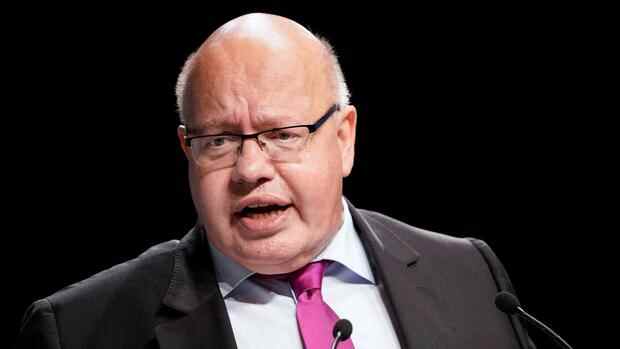The Federal Minister of Economics wants to completely abolish the EEG surcharge.
(Photo: imago images / Political-Moments)
Berlin, Düsseldorf Federal Minister of Economics Peter Altmaier (CDU) has spoken out in favor of completely abolishing the EEG surcharge for promoting green electricity as quickly as possible – in order to relieve electricity customers. “The reduced EEG surcharge in 2022 must not fizzle out as a one-off effect,” said Altmaier on Friday in Berlin.
The EEG surcharge for promoting green electricity will drop to its lowest level in ten years in 2022. This was announced by the transmission system operator on Friday. The surcharge to be paid by all consumers in principle will then only be 3.72 cents per kilowatt hour next year. Currently it is 6.5 cents. A federal grant of 3.25 billion euros contributed to this.
“Especially in times when the world market prices for gas, oil and coal are rising, the sharply lower EEG surcharge is good and important news for consumers in Germany as well as for the economy, especially small and medium-sized enterprises,” said Altmaier . The EEG surcharge should not remain at this level.
Industry, the renewables sector and associations have been demanding for years that the EEG be abolished and replaced by another funding mechanism and financed from the federal budget. Altmaier himself had, however, always postponed this debate into the future in recent years, although experts have been calling for consumers to be relieved of electricity prices for years.
Top jobs of the day
Find the best jobs now and
be notified by email.
In terms of electricity prices, Germany has long been the front runner in Europe. With an average price of 31 cents per kilowatt hour, the Federal Republic is far ahead of all other member states. The reason for this are the many taxes, levies and levies that are attributable to the electricity price in this country. They now make up around two thirds of the retail price. Overall, electricity prices in Germany have more than doubled since the turn of the millennium.
In particular, the surcharge through the EEG is repeatedly criticized. The federal government had capped the EEG share for the first time due to corona to 6.5 cents per kWh. The subsidy per kilowatt hour of green electricity has steadily fallen and is now being raffled off in auctions for large wind and solar parks, in which the one with the lowest subsidy is awarded the contract. The fact that the EEG surcharge has become consistently more expensive for consumers up to 2017 is due to the fact that the proportion of subsidized renewables has grown steadily.
The transmission system operators buy the electricity from the green producers and sell it on on the energy exchange – at market prices that are usually well below the remuneration paid. The difference comes from the EEG pot. That means: The levy increases when the exchange prices for electricity fall. But with the new federal government there could finally be some movement in the debate about the abolition of the subsidy surcharge.
Abolition could come under the traffic lights
Federal Environment Minister Svenja Schulze (SPD) called the lowering of the EEG surcharge “very good news” for the environment, but also for consumers. “Today we have made a big step forward on our way to the complete abolition of the EEG surcharge on the electricity price.”
“In times of rising prices for coal, oil and gas, it is a stroke of luck for Germany that we have renewable energies. Wind and solar power have long ceased to be price drivers, but rather price brakes. “
The courageous expansion of wind and solar plants is therefore also the best protection against the ups and downs on the fossil fuel world markets. “With the significant reduction in the EEG surcharge, we in Germany, unlike in many other European countries, can ensure that electricity prices do not rise in winter, but remain stable”.
The end of the EEG surcharge is also an issue in the current coalition talks. The SPD is committed to the complete abolition of the EEG surcharge. The FDP is also striving for this. The Greens want to at least lower them further. This is to be financed, among other things, by the CO2 levy on fuel, gas and heating oil. According to Altmaier, the federal subsidy for 2022 is already fed from this source.
He said it was feasible to finance an earlier abolition, the minister said. In the past, he had already asked Finance Minister Olaf Scholz (SPD) to continue the financing requirements for the planned cuts in the budget, which he did not do.
Altmaier did not want to anticipate the explorers how an abolition should be financed, whether solely through income from the CO2 levy, but through budget funds or through investment structures in addition to the budget.
More: Gas price shock for the global economy – “Energy crisis is becoming a question of survival for many companies”
